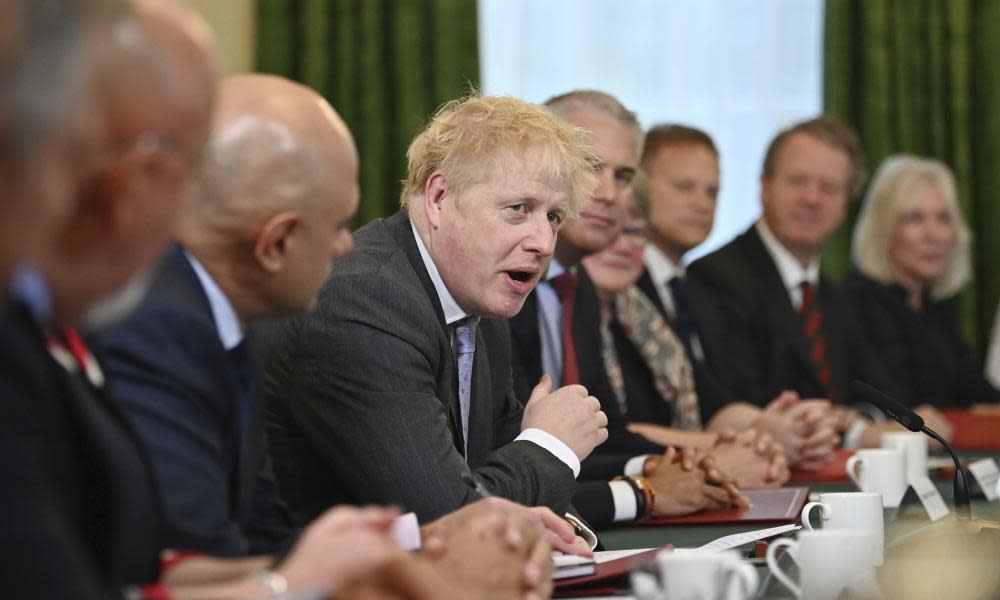Johnson’s reshuffle rewards Brexiters, culture warriors and key fixers

Boris Johnson’s cabinet reshuffle has included the promotion of culture warriors, more rightwingers and a string of his Brexiter “mates”, but his supporters claim the shake-up was more about getting key fixers in place to deliver policy before the next election.
Tory insiders point to the promotion of Nadine Dorries – a friend of Johnson’s wife, Carrie – to culture secretary and Kemi Badenoch to minister of state as a sign that culture warriors are in the ascendancy in government. The new-look cabinet also includes four more Brexiters than before, with big jobs for Dorries, Anne-Marie Trevelyan as trade secretary, Nadhim Zahawi as education secretary, and Simon Clarke as chief secretary to the Treasury.
Dorries, a critic of the BBC and “leftwing snowflakes”, will be in charge of the future of the BBC licence fee, the politically sensitive decision on Ofcom chair, and the new online harms bill. Badenoch, who is a senior housing minister with a second portfolio on equalities, is seen as an “anti-woke” voice, who has spoken out against schools supporting “the anti-capitalist Black Lives Matter group” or uncritically teaching “political race theory”.
Related: We’ve had a reshuffle, but no change of direction for this hapless government | Polly Toynbee
With Jacob Rees-Mogg, Priti Patel and Dominic Raab keeping seats at the top table, plus a promotion to foreign secretary for Liz Truss, a free marketeer and darling of Tory activists, there has been no shift towards the centre ground.
Anna Soubry, a former Tory who sat in cabinet under David Cameron, described the appointment of Dorries as “appalling” but said she thought the reshuffle was just as much an example of “chums” getting rewarded as a victory for rightwingers in the party.
“There has been a huge shift to the right, which is obviously linked to Brexit, but this is actually a cabinet of people doing as they are told and don’t rock the boat, plus he wanted to bring in his mates,” she said.
Zahawi is a longstanding backer of Johnson, while Nigel Adams, a friend of the prime minister, got a promotion to the Cabinet Office and another of his inner circle, Conor Burns, was installed as minister of state in the Northern Ireland Office.
One Tory MP described the reshuffle as a “mixed bag”, saying there was an element of “pandering to the culture warriors who want to talk about wokery all the time” but also that the decision to appoint Zahawi over the hotly tipped Badenoch in education appeared to reward his “competence in vaccines”, rather than prioritising picking political fights.
The decision to send Michael Gove, the Cabinet Office minister, to the Ministry of Housing, Communities and Local Government also appeared designed to seek a compromise over planning reforms and delivery, rather than necessarily stoking a row.
Tory opponents of the culture war approach to politics point to the disastrous argument over England players taking the knee in Euro 2020, which at one point appeared to pit ministers against Gareth Southgate’s popular team.
Related: Tory MP boycotting England games will follow Euro 2020 final on his phone
The culture war faction inside Number 10 is led by a husband-and-wife team of senior advisers, Dougie Smith and Munira Mirza, who former Tory aides say “really believe this stuff”.
“It definitely is those two along with some influential voices around them,” said one former staffer, who also mentioned the former BBC editor Robbie Gibb.
However, they said, “sometimes it comes down to whether Boris can be bothered to have a fight on this stuff” and it did not appear to be either a priority or a personal campaign for him.
It is understood that Mirza and Smith had previously championed Badenoch as education secretary, apparently in the hope that she would take the fight against the liberal metropolitan elite into England’s classrooms. However, she ended up being moved to Gove’s department with a promotion.
James Duddridge, a longtime supporter of Johnson, who lost his job as a Foreign Office minister in the reshuffle, said he felt he had personally “had a good innings and Boris needed to freshen the team”.
“Like McKinseys, I think there is a bit of up or out and he had to balance his team as well,” he said. “My view is that definitely some of the promotions are around meritocracy and how well you’ve done – like Nadhim Zahawi and Will Quince. There’s a lot of talent bubbling up and another generation biting at the ankles even of the people who have been appointed now. And that’s great.”
Duddridge said there was a view that Dorries had “defended the line internally and externally well; she is a good communicator”.
“I don’t think she’s been sent in to pick a fight or a punch-up. She’s been a high-performing minister going into a department where there are some tricky issues and where we are in a different place from … say Guardian readers or lefty liberals and there does need to be a bit of a robust defence of that,” he added.
Other Conservative MPs said there was an element of trying to promote those who could speak more naturally to red wall voters than traditional Tories. Clarke, a hardline Brexiter who represents Middlesbrough South and East Cleveland, is one example, and will be holding the purse strings when it comes to money for levelling up, as the new chief secretary to the Treasury.
One senior backbencher said: “You would think Nadine could better relate to red wall voters than Oliver [Dowden], so maybe she’ll give it all a bit more energy. But personally, I’ve always thought the whole business of culture wars was a very minority sport at both ends of the market.”

 Yahoo News
Yahoo News 
